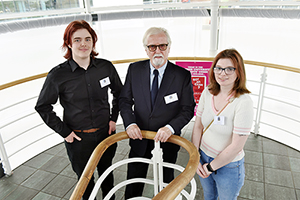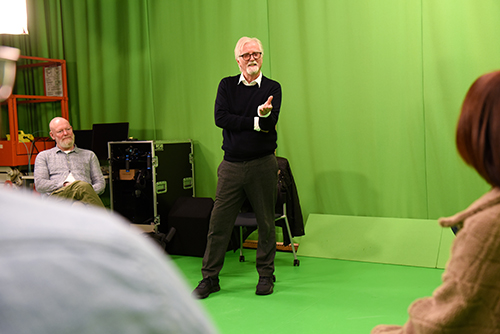Dr Laura Sillars, Dean of the School of Arts & Creative Industries, reflects on discussions with Franc Roddam about opportunities in the Film and Television production industry.
Renowned for cult-classic Quadrophenia, Auf Wiedersehen Pet and MasterChef, film maker, director, producer and one-time Norton-born Franc Roddam is a titan in industry. He is also known for his work capturing the complex lives of individuals who break the mould, such as the story of Michael ‘Mini’ who tried to burn down his own house as a child.

Franc generously supports a scholarship programme for Film and TV students at Teesside University and recently returned to meet some of those he supports as well as a wider cohort of students from every level. Each session involved coaching and mentoring. Franc was honest, engaging and insightful drawing on his experience of working inside institutions such as the BBC or industrial systems such as Hollywood. Below, I’ve tried to capture the questions our students asked and our shared learning …
Question.1: How do I get my first job?
It’s a question that many students have when thinking about their first steps in the industry. From day one, our courses demystify the process of working in the creative industries, but nevertheless, jumping out of uni and into the world is daunting.
Franc says: Do the Hustle
Franc focused on the reality that hustling – for work, for your project to be commissioned, funded, developed, repeated – is a reality throughout your career. Developing hustling skills is central to all creative industries. That doesn’t mean you have to holler like a market trader. Hustling is about building relationships, pitching in small and larger ideas to other people’s project, always having your pitch up your sleeve and getting involved. In the early days, really, you’re pitching yourself – can I work on this film? Is there a role I can progress to? If this seems off-putting, think of it like this, if you’re always working in the service of a film or tv project, then you’re offering to serve not to self-aggrandize.
The more experience you have the better service you can contribute to the community. So, keep up with the hustle! And don’t let rejection put you off. You’ll be hustling throughout the whole of your career in any career, so get started now! Hustle your tutors for extracurricular opportunities, or people you’d like to hear from in class who aren’t yet on the speaker list; attend the early career sessions run by the North East Screen agency and make sure they know you’re up for opportunities; hustle your local film festival to create a student slot … whatever it is don’t wait for something to be delivered on a plate … be proactive, go and ask for it
Question 2: How do I find the area that will suit me best?
It’s important to know what you want, where you are trying to get to – but how do you find this out in the early days of your career?
Franc says: ‘Know thyself’
Franc asked the group, are you a ‘top down’ person who is great with ideas and likes leading a band of creatives? Do you want to focus on writing/directing? Or are you a ‘bottom-up’, skills-based person who seeks to perfect an aspect of the craft (camera, sound, light, editing)? Yes, to make it work, you might need to become both for a time! But, if you have a sense of your direction, you can build the bank of evidence that you need to share with potential supporters (employers, commissioners, funders). This will also help you focus. Franc suggested to the group that they think about the areas that they naturally like doing, ask their classmates, ask their tutors where they seem to excel.
Apply self-reflection skills. What do I like doing? What am I naturally good at? Think broad here. Are you the one who makes tea and solves conflict? Producer! Are you the one who can problem solve the camera/screen/computer? Editor/Camera/Technical! Are you the one who goes behind the scenes and gets the props, costumes sorted? Art director! There are so many roles and routes, but finding one that connects to your inherent personality will let you thrive and enjoy your job. It will likely mean that you can excel.

Question 3: How do I build my career direction while making a living?
Your career will be long and rich and yes, you need to keep afloat and make a living. Most successful people had their own challenges in the early days.
Franc says: Take calculated risks!
Things have changed now, but when Franc started he faced the chicken and egg problem that you needed be in the right union to get a job, and to get into the right union you needed to have a track record. So, instead he joined an advertising firm. He explained that as well as being a junior advertising executive he would also need to gain production credits. When he was offered a role at the BBC for a 9-week contract, he resigned from his well-paid advertising job and took a risk. This was the flip he’d been waiting for – the move from making a living while building skills to making a career. Note here the hustling, the self-awareness, but also, the risk taking.
If you want to be a director/writer you need to keep making things even as you’re making a living. This can be challenging, so think carefully about which skills you seek to develop to make your way. Focusing on skills such as production (from runner to catering) might be better than going for the technical areas where it can take years to build up the skills. If you’re a technical skills-based specialist by nature, you will need people to feed back on your work so you can progress. Ongoing specialist technical mentoring through experienced members of your field is invaluable, so look out for people who will give this to you.
Question 4. What about when things go wrong?
The students talked about the fear of making an error, or how to come back from a rejection or having genuinely made a mistake.
Franc says: We all have moments when we fail, get a kicking or have to take feedback. Learn to listen and reflect … move on and learn.
Failure is part of learning. This does not mean that you fall flat on your face and can never get up again. It might be learning that a certain shot doesn’t work, that you’ve invested in a scene that falls apart because of the weather, the equipment, the actors, the camera, and you didn’t have the tool kit to sort it out. Franc talked about some of his early experiences in Hollywood where he wanted to make auteur-led, politically charged films that changed the world. He was, he realised, in the wrong place. In Hollywood, you do what Hollywood wants. He talked about getting great reviews and dreadful ones, often written by the same critics. Developing a thick skin and not defining your success by external markers.
Yes, criticism stings, but learning to fail better is about learning to work out what you can extract from the feedback you’ve received … however brutal it might be. Get back up. Dust yourself down. Collect your friends around you. Take a deep breath. Keep going.
No. 5 – How do I stand out from the crowd?
There are so many people who seek to work in this field and our students wanted to know how they could make themselves distinctive.
Franc says: Don’t we all want to be special?
Don’t worry about standing out. Work in service of the film or project that you’re ushering into the world. You might rise into the spotlight or become one of the many thousand of brilliant people who contributed skill and excellence to make something happen that is bigger than all of you put together. Find satisfaction in being part of the bigger whole: the film, the industry, the community.
Franc had been reading a book by the art editor of The New Yorker magazine Adam Gopnik on turning ideas into reality in The Real Work. Gopnik notes that there are masters everywhere – not just the celebrated names, but swathes of people. You might become a well-known person in your field, but this might not translate into fame that goes beyond that field. This does not mean that the work you’re doing is not important. Far from it, excellence depends upon a community of professionals dedicated to excellence. So, don’t chase fame, chose instead to seek solid, meaningful experiences of contributing to projects that excite you and which will live in your imagination for the future. If you can tell a great story about your contribution to a project, that is a marker of success.
To conclude, our sessions with Franc were inspirational. I watched first year students have their concepts coached and creatively challenged by a master in the field. I heard second year students critically reflecting upon their productions. Final year students talked positively about the next steps in their career, and masters students spoke confidently about how they could influence change in their sector. I heard our students talking about their work, their careers and their collaborations with each other. They were just amazing.
I left feeling enormously hopeful about the future of film and tv!
Find out more about our courses:
BA (Hons) Film and Television Production
MA Producing for Film and Television


